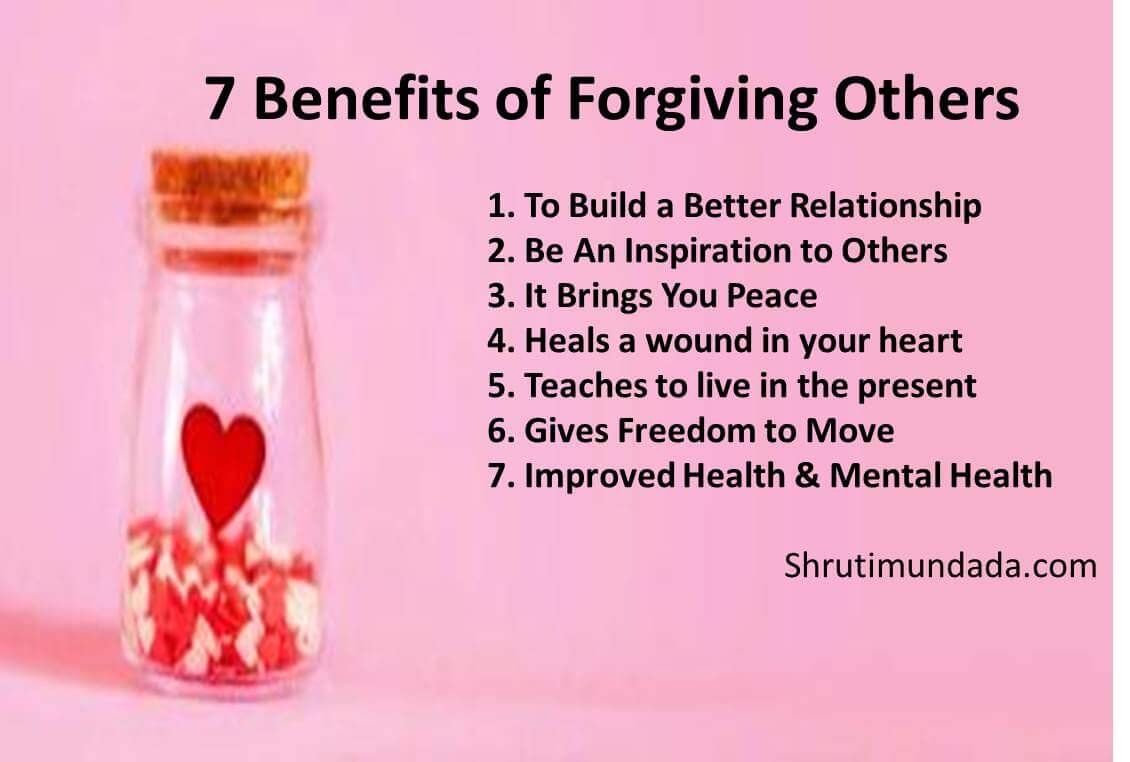Reasons to Practice Forgiveness to Heal Yourself…
Forgiveness is the single best thing you can do to heal your self-talk. In forgiveness, we are literally rewiring our brains and giving ourselves more power.

Fostering habits of forgiveness
When you harbor feelings of anger and resentment, it takes a toll on your physical and emotional health. Forgiveness can lead to healthier relationships, improved mental health, and even decreased stress levels. If you’re struggling to forgive someone who has hurt you, here are a few tips:
- Acknowledge your feelings. It’s okay to feel angry, hurt, or betrayed. Don’t try to push these feeling down. Recognize that they are valid and allow yourself to experience them.
- Make a decision to forgive. Forgiveness is a choice, not a feeling. Once you’ve processed your emotions, you can decide whether or not to forgive the person who hurt you.
- Communicate with the person if possible. If the person who hurt you is willing to talk about what happened, it can be helpful to do so. This can help diffuse some of the negative emotions and lead to a better understanding of the situation.
- Practice self-compassion. It’s important to be kind to yourself during this process. Be patient with yourself and allow yourself time to heal.”

What is wrong with unforgiveness
When we don’t forgive, we’re constantly reliving the hurt and betrayal we felt when we were first wronged. Our brains are hardwired to hold on to negative experiences more than positive ones, which means that unforgiveness can take up a lot of mental space and energy. holding onto unforgiveness can also lead to physical problems like high blood pressure, anxiety, and depression. Unforgiveness is also harmful to our relationships. When we’re holding a grudge, we’re not able to fully engage with the people in our lives. We may withdraw from them or act out in anger. This can damage our closest relationships and make it difficult to form new ones.
What can I do to foster more forgiveness?
Assuming you would like content for a blog titled “Reasons to Practice Forgiveness to Heal Yourself”:
One of the best things we can do for our own mental and emotional health is to practice forgiveness. When we forgive others, it can help us to let go of anger, resentment, and feelings of revenge. Forgiveness can also lead to improved physical health, as well as overall better psychological well-being.
There are many different ways to foster forgiveness. One way is to simply acknowledge that we all make mistakes and that nobody is perfect. We can also try to see things from the other person’s perspective, even if we don’t agree with their actions. It’s important to remember that forgiveness is a choice – it’s not always easy, but it is always worth it.
If you’re struggling to forgive someone, it may be helpful to talk about your feelings with a friend or therapist. You can also try writing down your thoughts and emotions in a journal. Practicing forgiveness is an ongoing process, but it’s one that will lead to a more peaceful and fulfilling life.
Why should I practice forgiveness
When you are the victim of a transgression, it is natural to want revenge or justice. You may feel that the person who wronged you doesn’t deserve your forgiveness. However, harboring these negative emotions can actually do more harm than good. If you don’t learn to forgive, you will carry around resentment and bitterness, which can poison your relationships and lead to poor physical health.
Here are some reasons why you should practice forgiveness:
- Forgiveness can help heal the wounds of the past.
- Forgiveness can improve your mental and physical health.
- Forgiveness can help you let go of anger and resentment.
- Forgiveness can increase your self-esteem and sense of well-being.
- Forgiveness can reduce stress and anxiety in your life.
- Forgiveness can improve your relationships with others

Techniques of practicing forgiveness
- Acknowledge what you’re feeling: When someone wrongs us, it’s natural to feel angry, hurt, or resentful. These feelings are a normal part of the healing process. Don’t try to bottle them up or push them away. Acknowledge them and allow yourself to feel them fully.
- Visualize the person who harmed you: picturing the person who harmed you in your mind can help you see them as a human being with their own struggles and challenges, rather than an enemy to be avoided or conquered.
- Write a letter to the person: even if you don’t plan on sending it, writing out your thoughts and feelings can help you release them and achieve closure.
- Practice self-compassion: forgive yourself for any role you may have played in the situation, and extend compassion to yourself as you heal from the hurt.
- Extend compassion to others: remember that everyone is fighting their own battles, and extend compassion and understanding to those around you, even when they make mistakes.

